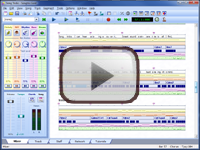(8.2) Improvising on the Song Scale
The most straightforward method of choosing a scale for improvisation is to simply to adopt the scale of the song.
You can usually decide what scale a song is in from its key signature (if the music is written in staff notation) or from its starting or ending chords. For example, a song which starts and ends with the Cmaj chord is very likely to be in the scale of C Major.
In the earlier tutorial on relations, we looked at several chord progressions which were in the key of C Major. We should be able to use the C Major scale to improvise over any of these.
Let's test this idea with a couple of them, first by adding the C Major scale, then by adding an random improvisation using C Major.


Simply using the song scale like this is the easiest approach to improvisation, but it often doesn't give the best results, for two reasons.
Firstly, the static melodic structure is noticeable after a while. Compared to the changing chord progressions above, which have a sensation of movement, improvised melodies using a single scale can feel a little bland and aimless.
Secondly, a single scale is often not enough for a whole chord progression. All of the chords used above are compatible with C Major, but many songs contain a mix of chords which do not all belong to the same scale.
We saw an example of this type of sequence, with changing key centres, in an earlier tutorial. Let's look at that example again, and see what happens if we try to use the C Major scale for improvising over it.

This time, you will hear a strong dissonance with some of the chords, in particular E7 and A7, neither of which is very compatible with the C Major scale.
To improve the sound of our improvisation, we need to change the scale we are using with each key centre, by finding scales that are closely related to each groups of chords in the progression.
We already have some key centres for this chord progression from before, let's try improvising with these instead.

You should notice immediately that the sound of the changing scales over the chord progression delivers a stronger, more coordinated feel. Even the random improvisation, while not always perfectly executed, creates more interesting and richer melodies.
We can go one step further than this, and change our improvisation scale with every chord.

In general, this strategy of selecting a scale to suit each individual chord will give you the best improvisation results, providing a tight-fitting melodic structure to support the changing harmony.
How do we work out which scale to use for each different chord? This is where the concept of related chords and scales, introduced earlier, comes to the rescue.
|
Topic 97 of 117
| ||
Bring these music concepts to life with the free Songtrix Bronze Edition as you create songs from chords and scales.
Then publish and share your ideas with the other musicians you meet on the ChordWizard Network.
Have questions? Join the ChordWizard Network and post them in the Music Theory forum for answers and discussions on your topics of interest.








